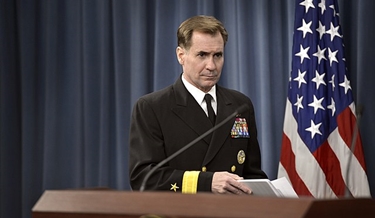Rear Admiral John Kirby, the NSC’s Coordinator for Strategic Communications held a briefing, 0n 8 February 2023, for the journalists at the State Department about the Biden-Harris administration’s national security and foreign policy priorities.
The correspondent from Kazinform, the news service of Kazakhstan asked a question about any possible adjustments in the policy of the USA toward Central Asia.
His response can be called ‘famously vague.’ This is an allusion to his fascination with this phrase used by a journalist from the Baltics in a question earlier in the briefing about the NATO stance in the context of Ukraine. Before answering that question, Kirby said that ‘famously vague’ could be the title of his autobiography.
This is the part of the transcript related to the conversation between Kirby and Augustinas and the phrase ‘famously vague.’:
QUESTION: Thank you. I’m Augustinas from Lithuania public broadcaster. I wanted to ask – could you preview for a bit what decisions can be realistically expected this year in NATO summit in Lithuania? For example, do you think that it’s realistic to expect for NATO to somehow more specifically define its future relationship with Ukraine, for example compared to 2008 summit in Bucharest which was famously vague, and for example —
REAR ADMIRAL KIRBY: Famously vague?
QUESTION: Yeah. It – there was a promise that Ukraine will be —
REAR ADMIRAL KIRBY: Famously vague – that sounds like the title of my autobiography. I like that. (Laughter.)
QUESTION: Yeah.
REAR ADMIRAL KIRBY: I just – sorry, it just stuck in my head. I’m sorry, I completely blew up the question.
QUESTION: Kozhybayev Rustem, International News Agency Kazinform from Kazakhstan. My question about the United States strategy for Central Asia. I would like to ask: Are the United States considering correction the strategy for Central Asia in the context of the change in geopolitical situation? And if so, what changes can be expected? What are the prospects for adopting a new strategy for Central Asia given the fact that the current one was adopted during the United States presence in Afghanistan? Thank you very much.
REAR ADMIRAL KIRBY: Can you just – the first question you —
QUESTION: The first question about United States considering correction —
REAR ADMIRAL KIRBY: Correction?
QUESTION: Correction, yes, the strategy for Central Asia.
REAR ADMIRAL KIRBY: Well, there’s a lot there. And I certainly would refer you to my colleagues at the State Department (inaudible) speak (inaudible) much more clarity than me. We have been grateful to Central Asian countries for the support many of them helped provide us while we were fighting in Afghanistan, and we continue to stay closely linked and in conversation with many of those countries, particularly now that we are not in Afghanistan, and recognizing that the – recognizing continued credible threat by groups like ISIS in the region.
I don’t know of a – that our strategy, as you put it, is being rewritten or needs to be rewritten. Again, I’d refer you to the State Department on that. All I’d say is that we recognize the importance of Central Asia on so many levels. I talked about terrorism, but it’s beyond that, of course – energy security, food security, climate change. There’s an awful lot on the agenda with Central Asian states, but again, I don’t know of any shifts that are coming.
Yeah.
The complete transcript of the press conference can be found here: https://www.state.gov/
/// nCa, 10 February 2023
